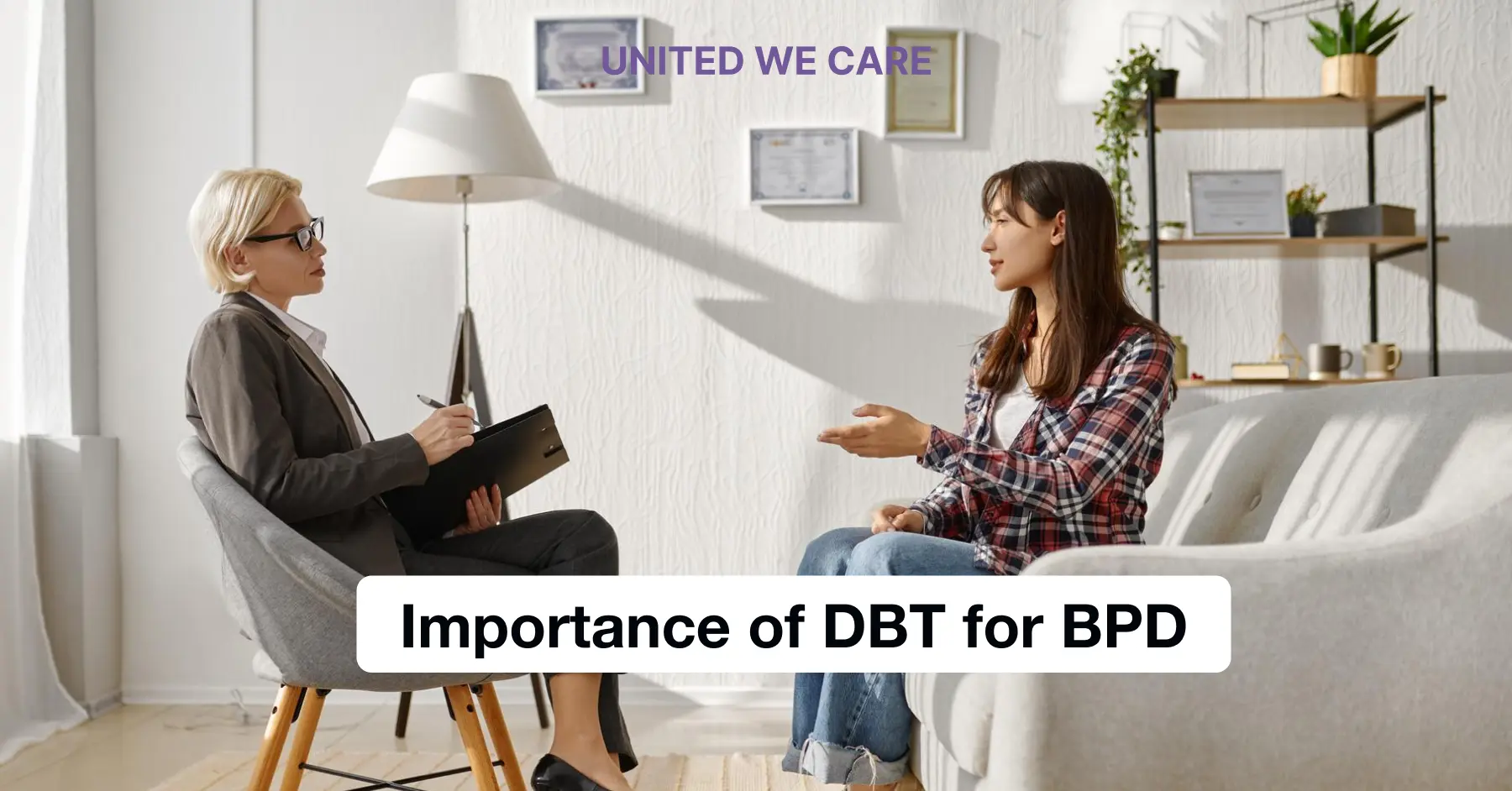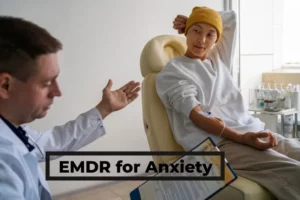Introduction
In India, the prevalence of Borderline Personality Disorder (BPD) is around 9% of the population. Increased impulsivity and reactivity, as well as severe instability in your relationships, emotions, and self-image, are all possible symptoms of borderline personality disorder (BPD).[2] BPD can emerge as a result of social circumstances, dysfunctional childhood environments, brain functioning variations, or heredity. Though having BPD can make daily living difficult, it is possible to lead a happy and healthy life with the correct assistance and knowledge. You can effectively treat BPD with the aid of medication and therapy. For BPD, dialectical behavior therapy (DBT) is one of the most successful treatment modalities available today. In this blog, we’ll learn more about this personality disorder and how to treat BPD with DBT.
DBT for BPD
If you have borderline personality disorder, you likely struggle with:
- Fear of abandonment: You become overly dependent and clingy on others and constantly seek their reassurance and attention.
- Distorted sense of self: You feel fundamentally flawed or worthless, which leads to you frequently changing your goals, values, and identity. You may also be disconnected from your thoughts, feelings, and surroundings for prolonged periods. [3]
- Chaotic relationships: You shift between extremes, such as labeling people, things, or situations as all good or all bad, leaving no room for a middle ground. Your relationships are intense and unstable, with a pattern of idealizing and devaluing people. You may also react disproportionately to challenging situations, such as throwing an uncontrolled fit of rage.
- Impulsivity: You engage in binge eating, overspending, reckless driving, substance abuse, self-harm actions, etc.
To manage these symptoms, Dr Marsha Linehan developed dialectical behavior therapy, which is widely used for the treatment of BPD today. Sometimes also known as talk therapy, DBT is based on cognitive-behavioral principles and is structured into four main components- group skills training, individual psychotherapy, telephone consultation, and therapist consultation team.[4] Together, these components are aimed at teaching you behavioral skills, namely mindfulness, emotional regulation, distress tolerance, and interpersonal effectiveness, which can help you manage your symptoms.
How Does DBT Work for BPD?
The core principle of DBT is to learn to accept your experiences and consciously work towards changing your unhealthy patterns of thoughts and behavior. To do this, you must monitor your symptoms and apply the behavioral skills taught in DBT modules, mainly [5]

- Mindfulness: This refers to your ability to reach and maintain a balanced state of mind. Through meditation, you can learn to stay in the present, be aware of, and simply accept what you’re feeling, the sensations in your body, and things happening in your surroundings without judging them to be good or bad.
- Emotional regulation: This entails identifying your intense emotion and managing it by acting in the opposite way of your urges so that you can respond in a healthy and non-destructive way. For instance, you choose to take a step back and journal your feelings when you have the urge to yell at someone.
- Distress tolerance: By activating yourself on a physiological level, you can learn to tolerate and survive distressing situations without impulsively engaging in risky behavior such as substance use, violence, or self-harm. For instance, you can immerse your face in ice-cold water or engage in paced breathing, which takes your mind away from your impulses and provides a buffer for you to make a thoughtful decision.
- Interpersonal effectiveness skills: Communicating your needs with clarity and assertiveness, maintaining your self-respect in interactions, and learning to manage conflict can help you have better relationships with people. For instance, you use role-playing as a tool to express, assert, and reinforce yourself.
Is DBT Good for BPD?
Most recent studies have evaluated and deemed DBT to be effective in the treatment of BPD:
In a 2019 study of 44 patients with BPD undergoing a 5-week inpatient DBT course, researchers found that this therapy significantly reduced symptoms of BPD and improved emotional regulation capabilities in the participants. [6]
A 2021 study on 114 participants found an 18–20-week Dialectical Behavior Therapy Skills Training Group (DBT-ST) to have a significant decrease in BPD symptoms as well as in emergency department cases post-intervention. [7]
A 2022 study in Canada explored the effectiveness of 6 months of DBT on patients with BPD. The results suggest that a shorter, comprehensive DBT treatment can effectively reduce tendencies of self-harm and improve coping skills in the participants as compared to a longer 12-month DBT treatment. [8]
Why DBT is Effective for BPD
The reality we live in is less than ideal. Social inequality, war and injustice, economic uncertainties, the pressure to conform to the unrealistic expectations of society, and the further distortion of reality by social media can all trigger and worsen the symptoms of BPD.
- The main reason why DBT is effective in managing BPD is because it targets the core symptoms of BPD while also taking into account the stressors we commonly face today and teaching us coping mechanisms to deal with them.
- The use of a dialectical approach, i.e., using self-acceptance with a push for healthy change for balanced well-being, is also crucial in making DBT a successful intervention.
- DBT is also one of the most accessible forms of therapy since online platforms are increasingly offering trained therapists and affordable group therapy sessions.
- Providing you with practical skills in a structured way, which helps you apply them easily in your daily life, is also one of the reasons that makes it an effective and popular therapy. The supportive relationship with the therapist can also help mirror better relationships in your life.
- DBT is also a great option to use in conjunction with medication for comorbidities like depression and other psychotherapies such as cognitive behavioral therapy (CBT).
Conclusion
Dialectical behavioral therapy is very effective in managing borderline personality disorder. A trained psychotherapist can use DBT to help you create awareness of your thinking and behavior patterns, accept them, and urge you to bring healthy changes through mindfulness, emotional regulation, distress tolerance, and interpersonal effectiveness strategies.
Book a session with one of our mental health experts, who can help manage your BPD with DBT. At United We Care, we offer the most appropriate, clinically backed solutions for all your needs for well-being.
References:
[1] P. Sharan, “An overview of Indian research in personality disorders,” Indian Journal of Psychiatry, vol. 52, Suppl 1, pp. S250–S254, 2010. [Online]. Available: https://doi.org/10.4103/0019-5545.69241. Accessed: Nov. 28, 2023.
[2] American Psychological Association, “Borderline Personality Disorder,” in APA Dictionary of Psychology. [Online]. Available: https://dictionary.apa.org/borderline-personality-disorder. Accessed: Nov. 28, 2023.
[3] National Alliance on Mental Illness, “Borderline Personality Disorder,” NAMI. [Online]. Available: https://www.nami.org/About-Mental-Illness/Mental-Health-Conditions/Borderline-Personality-Disorder. Accessed: Nov. 28, 2023.
[4] J. M. May, T. M. Richardi, and K. S. Barth, “Dialectical behavior therapy as treatment for borderline personality disorder,” The Mental Health Clinician, vol. 6, no. 2, pp. 62–67, 2016. [Online]. Available: https://doi.org/10.9740/mhc.2016.03.62. Accessed: Nov. 28, 2023.
[5] Jennifer M May, MD; Toni M Richardi, PsyD; Kelly S Barth, DO, “Dialectical behavior therapy as treatment for borderline personality disorder in The Mental Health Clinician, vol. 6, no. 2. [Online]. Available: https://meridian.allenpress.com/mhc/article/6/2/62/127854/Dialectical-behavior-therapy-as-treatment-for. Accessed: Nov. 28, 2023.
[6] PROBST, THOMAS PhD; O’ROURKE, TERESA; DECKER, VERENA MSc; KIEßLING, EVA; MEYER, SASCHA DiplPsych; BOFINGER, CHRISTINE MD; NIKLEWSKI, GÜNTER MD, PhD; MÜHLBERGER, ANDREAS PhD; PIEH, CHRISTOPH MD, “Effectiveness of a 5-Week Inpatient Dialectical Behavior Therapy for Borderline Personality Disorder,” in Journal of Psychiatric Practice, 25(3):p 192-198, May 2019. [Online]. Available: https://journals.lww.com/practicalpsychiatry/abstract/2019/05000/effectiveness_of_a_5_week_inpatient_dialectical.4.aspx. Accessed: Nov. 28, 2023.
[7] Sharon L. Heerebrand, Jemma Bray, Christine Ulbrich, Rachel M. Roberts, Suzanne Edwards, “Effectiveness of dialectical behavior therapy skills training group for adults with borderline personality disorder,” in Journal of Clinical Psychology, Volume77, Issue7, Pages 1573-1590, July 2021. [Online]. Available: https://onlinelibrary.wiley.com/doi/abs/10.1002/jclp.23134. Accessed: Nov. 28, 2023.
[8] Shelley F. McMain; Alexander L. Chapman; Janice R. Kuo; Katherine L. Dixon-Gordon; Timothy Henry Guimond; Cathy Labrish; Wanrudee Isaranuwatchai; David L. Streiner, “The Effectiveness of 6 versus 12 Months of Dialectical Behavior Therapy for Borderline Personality Disorder: A Noninferiority Randomized Clinical Trial,” in Psychotherapy and Psychosomatics, vol. 91, no. 6: 382–397, 2022. [Online]. Available: https://karger.com/pps/article/91/6/382/826589/The-Effectiveness-of-6-versus-12. Accessed: Nov. 28, 2023.










